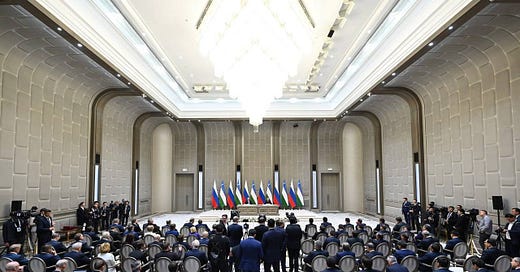Uzbekistan’s energy needs lock it into Russian orbit
Moscow is going to provide Tashkent with nuclear power, gas, and maybe even electricity. How much loyalty will it seek in return?
Uzbekistan has for years been bedevilled by an electricity shortage crisis that experts have warned will get worse in future.
And then along came Russia.
During his state visit to Tashkent on Monday, Russian President Vladimir Putin oversaw the signing of an agreement for state-owned Rosatom to build a small nuclear plant in Uzbekistan.
His Uzbek counterpa…
Keep reading with a 7-day free trial
Subscribe to Havli - A Central Asia Substack to keep reading this post and get 7 days of free access to the full post archives.





